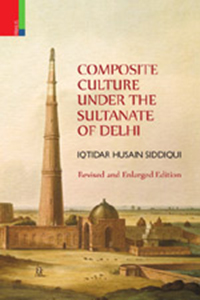
Composite Culture Under the Sultanate of Delhi
AUTHOR : Iqtidar Husain Siddiqui
| HB ₹995 . $59.95 . ₤39.95 |
e-Book ₹895 . $53.95 . ₤35.95 |
|
INFORMATION
- AUTHOR : Iqtidar Husain Siddiqui
- HB ISBN : 978-93-84082-17-8
- EBOOK ISBN : 978-93-84092-87-0
- HB Year : 2016, E-BOOK Year : 2017
- Extent: 216 pp.
- Discount available on checkout
- Usually dispatched within 3 to 5 working days.
Composite Culture Under the Sultanate of Delhi
| HB ₹ 795 . $ . ₤ |
PB ₹ . $ . ₤ |
|
| POD ₹ . $ . ₤ |
e-Book ₹ . $ . ₤ |
INFORMATION
- AUTHOR – P K Basant
- ISBN – 978-93-80607-15-3
- Year – 2012
- Extent: 400 + 40 coloured illustrations
- 10% discount + free shipping
- Usually dispatched within 3 to 5 working days.
This work explores the cultural orientation of the sultanate of Delhi, a subject on which little work has been done so far. The architects of the sultanate introduced a new system of governance with novel social and cultural institutions, and Persian as an official language. These were significant moves as they served as catalysts for social change. Alongside, the emergence of new urban centres as well as the setting up of colonies of foreign immigrants from lands of more advanced culture in the old towns led to the transfiguration of culture in the sultanate. Thus, this book examines those aspects of culture that have hitherto not been paid adequate attention.
Composite Culture under the Sultanate of Delhi is divided into three parts. The first explores the role played by the metropolis of Delhi as an integrating nucleus, and examines the cultural and social relationship between the Hindus and Muslims, and the intellectual and diplomatic atmosphere of the times. The second part focuses on the nature of the relationship between the sultans of Delhi and the Mongol rulers of Central Asia. The third part examines the life and position of women and the attitude of different classes of society towards their women folk during the sultanate period.
The Author
Iqtidar Husain Siddiqui has served as the Chairman, Department of History and Coordinator, Centre of Advanced Study, Department of History, Aligarh Muslim University, Aligarh.
This work explores the cultural orientation of the sultanate of Delhi, a subject on which little work has been done so far. The architects of the sultanate introduced a new system of governance with novel social and cultural institutions, and Persian as an official language. These were significant moves as they served as catalysts for social change. Alongside, the emergence of new urban centres as well as the setting up of colonies of foreign immigrants from lands of more advanced culture in the old towns led to the transfiguration of culture in the sultanate. Thus, this book examines those aspects of culture that have hitherto not been paid adequate attention.
Composite Culture under the Sultanate of Delhi is divided into three parts. The first explores the role played by the metropolis of Delhi as an integrating nucleus, and examines the cultural and social relationship between the Hindus and Muslims, and the intellectual and diplomatic atmosphere of the times. The second part focuses on the nature of the relationship between the sultans of Delhi and the Mongol rulers of Central Asia. The third part examines the life and position of women and the attitude of different classes of society towards their women folk during the sultanate period.
The Author
Dr P K Basant is Associate Professor of History at the Jamia Millia Islamia, New Delhi.





